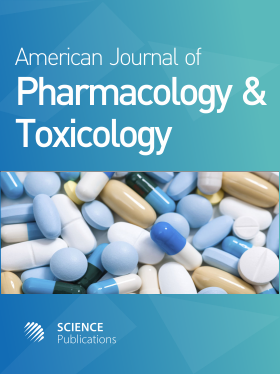EFFECT OF DIMETHOATE (AN ORGANOPHOSPHATE INSECTICIDE) ON THE REPRODUCTIVE SYSTEM AND FERTILITY OF ADULT MALE RAT
- 1 University of Dschang, Cameroon
- 2 University of Yaounde I, Cameroon
Abstract
The pesticides are one of the most potentially harmful chemicals liberated in the environment in an unplanned manner. Dimethoate is widely used as a potent pesticide in many countries and has been shown to produce some adverse health effects. In the present study, we investigated the effect of dimethoate (an organophosphate insecticide) on the reproductive system and fertility of male rats and the possible mechanism underlining its action. Twenty four adult Wistar male rats were divided into 4 groups of 6 animals per group and force-fed with 0, 3.66, 5.50 and 11 mg kg-1 body weight of dimethoate for 90 days. At 80 days of treatment, each males was allows to mate with two primiparous cyclic females. The results showed a significant decrease (p<0.05) of body weight gain in rats gavaged with dimethoate compared to control. In addition, this insecticide at the doses of 3.66, 5.5 and 11 mg kg-1 caused a significant (p<0.05) increase of the relative weight of epididymis. Dimethoate at its highest dose caused a decrease in the relative weights of testes and ventral prostate. The doses 3.66, 5.50 and 11.00 mg kg-1 body weight of dimethoate caused a significant decrease (p<0.05) of the sperm concentration and motility. The level of protein and cholesterol in the serum and testes as well as the activity of prostatic acid phosphatase decreased significantly (p<0.05) in rats treated with dimethoate compared to control. Fertility, gestation and parturition indices as well as the litter size decreased significantly in animals treated with 5.50 and 11.00 mg kg-1 body weight of dimethoate compared to control. The testicular histology of animals treated with high doses of dimethoate generally showed span of Sertoli cells destruction and disorganization of the germinal epithelium. The lumen of seminiferous tubules of treated rats was generally poor in sperm. The results of this study confirmed that dimethoate seriously deteriorate the male reproductive system resulting in decreased fertility.
DOI: https://doi.org/10.3844/ajptsp.2014.75.83

- 4,976 Views
- 4,258 Downloads
- 43 Citations
Download
Keywords
- Dimethoate
- Spermatogenesis
- Fertility
- Testis Histology
- Male Rats
